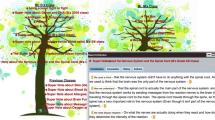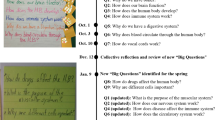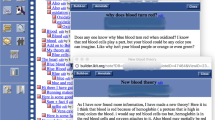Abstract
Research on computer-supported collaborative learning faces the challenge of extending student collaboration to higher social levels and enabling cross-boundary interaction. This study investigated collaborative knowledge building among four Grade 5 classroom communities that studied human body systems with the support of Idea Thread Mapper (ITM). While students in each classroom collaborated in their local (home) discourse space to investigate various human body functions, they generated reflective syntheses— “super notes”—to share knowledge progress and challenges in a cross-community meta-space. As a cross-community collaboration, students from the four classrooms further used the Super Talk feature of ITM to investigate a common problem: how do people grow? Data sources included classroom observations and videos, online discourse within each community, students’ super notes and records of Super Talk discussion shared across the classrooms, and student interviews. The results showed that the fifth-graders were able to generate high quality super notes to reflect on their inquiry progress for cross-classroom sharing. Detailed analysis of the cross-classroom Super Talk documented students’ multifaceted understanding constructed to understand how people grow, which built on the diverse ideas from each classroom and further contributed to enriching student discourse within each individual classroom. The findings are discussed focusing on how to approach cross-community collaboration as an expansive and dynamic context for high-level inquiry and continual knowledge building with technology support.






Similar content being viewed by others
Availability of data and material
Following our IRB protocol, the data of this study cannot be made openly available. Those who are interested to access the detailed coding frameworks and data samples can send their requests to the authors.
Code availability
The Idea Thread Mapper (ITM) software is freely available to educators and students for classroom use. Developers who are interested to create or integrate software tools inter-operatable with ITM are welcome to reach out to the authors about their needs.
References
Bereiter, C., & Scardamalia, M. (2021). Meeting in Knowledge Building Collaboratories and Metaspaces to Advance Knowledge for Public Good. Ontario, Canada: Keynote at the Knowledge Building Summer Institute, University of Toronto
Chen, B., Håklev, S., & Rosé, C. (2021). Collaborative Learning at Scale. In U. Cress, C. Rosé, A. Wise, & J. Oshima (Eds.), International Handbook of Computer-Supported Collaborative Learning. Springer. https://www.springer.com/gp/book/9783030652906
Collins, A., Joseph, D., & Bielaczyc, K. (2004). Design research: Theoretical and Methodological issues. The Journal of the Learning Sciences, 13(1), 15–42
Cress, U., Moskaliuk, J., & Jeong, H. (2016). Mass Collaboration and Education. Springer. https://doi.org/10.1007/978-3-319-13536-6
Cress, U., Oshima, J., Rosé, C., & Wise, A. (Eds.). (2021). International Handbook of Computer-Supported Collaborative Learning. Cham. DOI: Springer. https://doi.org/10.1007/978-3-030-65291-3
Csikszentmihalyi, M. (1999). Implications of a Systems Perspective for the Study of Creativity. In R. J. Sternberg (Ed.), Handbook of Creativity (pp. 313–335). Cambridge, UK: Cambridge University Press
Damşa, C. I. (2014). The multi-layered nature of small-group learning: Productive interactions in object-oriented collaboration. International Journal of Computer-Supported Collaborative Learning, 9(3), 247–281
Dunbar, K. (1997). How scientists think. On-line creativity and conceptual change in science
Engeström, Y. (2008). From Teams to Knots: Activity-Theoretical Studies of Collaboration and Learning at Work. Cambridge, UK: Cambridge University Press
Engeström, Y. (2014). Learning by Expanding (2nd edition). Cambridge, UK: Cambridge University Press
Ferschke, O., Howley, I., Tomar, G., Yang, D., Liu, Y., & Rosé, C. P. (2015). Fostering Discussion across Communication Media in Massive Open Online Courses. In O. Lindwall, P. Häkkinen, T. Koschman, P. Tchounikine, & S. Ludvigsen (Eds.) Exploring the Material Conditions of Learning: The Computer Supported Collaborative Learning (CSCL) Conference 2015, Volume 1. Gothenburg, Sweden: The International Society of the Learning Sciences
Järvelä, S., Kirschner, P. A., Hadwin, A., Järvenoja, H., Malmberg, J., Miller, M., & Laru, J. (2016). Socially shared regulation of learning in CSCL: Understanding and prompting individual-and group-level shared regulatory activities. International Journal of Computer-Supported Collaborative Learning, 11(3), 263–280
Hmelo-Silver, C. E., & Barrows, H. S. (2008). Facilitating Collaborative Knowledge Building. Cognition and Instruction, 26(1), 48–94
Hollands, F. M., & Tirthali, D. (2014). MOOCs: Expectations and Reality. Teachers College, Columbia University: Center for Benefit-Cost Studies of Education
Huang, J., Hmelo-Silver, C. E., Jordan, R., Gray, S., Frensley, T., Newman, G., & Stern, M. J. (2018). Scientific discourse of citizen scientists: Models as a boundary object for collaborative problem solving. Computers in Human Behavior, 87, 480–492. https://doi.org/10.1016/j.chb.2018.04.004
Laferriere, T., Law, N., & Montané, M. (2012). An International Knowledge Building Network for Sustainable Curriculum and Pedagogical Innovation. International Education Studies, 5, 148–160
Latour, B., & Woolgar, S. (1986). Laboratory Life: The Construction of Scientific Facts. Princeton, NJ: Princeton University Press
Lai, M., & Law, N. (2006). Peer Scaffolding of Knowledge Building through Collaborative Groups with Differential Learning Experiences. Journal of Educational Computing Research, 35(2), 123–144
Law, N., Zhang, J., & Peppler, K. (2021). Sustainability and Scalability of CSCL Innovations. In U. Cress, J. Oshima, C. Rosé, & A. Wise (Eds.), International handbook of computer-supported collaborative learning (pp. 121–141). Berlin: Springer https://doi.org/10.1007/978-3-030-65291-3_7
Lemke, J. L. (2000). Across the Scales of Time: Artifacts, Activities, and Meanings in Ecosocial Systems. Mind culture and activity, 7(4), 273–290
Li, N., Verma, H., Skevi, A., Zufferey, G., Blom, J., & Dillenbourg, P. (2014). Watching MOOCs Together: Investigating Co-Located MOOC Study Groups. Distance Education, 35, 217–233
McGuire, R. (2013). Building a Sense of Community in MOOCs. Campus Technology, 26 (12) pp. 31–33. Retrieved on November 6th, 2014. https://campustechnology.com/articles/2013/09/03/building-a-sense-of-community-in-moocs.aspx
Mercer, N., & Littleton, K. (2007). Dialogue and the Development of Children’s Thinking: A Sociocultural Approach. Routledge
Organization for Economic Cooperation and Development (OECD) (2018). The Future of Education and Skills: Education 2030. OECD Education Working Papers
Pendleton-Jullian, A. M., & Brown, J. S. (2018). Design Unbound: Designing for Emergence in a White Water World (2 vol.). Cambridge, MA: The MIT Press
QSR International (1999). NVivo Qualitative Data Analysis Software [Software]. Available from https://qsrinternational.com/nvivo/nvivo-products/
Sawyer, R. K. (2005). Social Emergence: Societies as Complex Systems. Cambridge, UK: Cambridge University Press
Sawyer, R. K. (2007). Group Genius: The Creative Power of Collaboration. New York, NY: Basic Books
Scardamalia, M. (2002). Collective Cognitive Responsibility for the Advancement of Knowledge. Liberal Education in a Knowledge Society, 97, 67–98
Scardamalia, M., & Bereiter, C. (2006). Knowledge Building: Theory, Pedagogy, and Technology. Cambridge Handbook of the Learning Sciences (pp. 97–118). Cambridge, UK: Cambridge University Press
Slotta, J., Suthers, D., & Roschelle, J. (2014). CIRCL Primer: Collective Inquiry and Knowledge Building (CIRCL Primer Series). Retrieved from http://circlcenter.org/collective-inquiry-knowledge-building/
Star, S. L., & Griesemer, J. R. (1989). Institutional Ecology, “Translations” and Boundary Objects: Amateurs and Professionals in Berkeley’s Museum of Vertebrate Zoology, 1907–39. Social Studies of Science, 19, 387–420
Stahl, G. (2013). Learning across levels. International Journal of Computer-Supported Collaborative Learning, 8(1), 1–12
Sternberg, R. J. (2003). The Development of Creativity as a Decision-Making Process. In R. K. Sawyer, V. John-Steiner, S. Moran, R. J. Sternberg, D. H. Feldman, H. Gardner, & M. Csikszentmihalyi (Eds.), Creativity and Development (pp. 91–138). New York, NY: Oxford University Press
Tan, S. C., Chan, C., Bielaczyc, K., et al. (2021). in press) Knowledge building: aligning education with needs for knowledge creation in the digital age. Educational Technology Research and Development, 69, 2243–2266. https://doi.org/10.1007/s11423-020-09914-x
van Aalst, J. (2009). Distinguishing knowledge-sharing, knowledge-construction, and knowledge-creation discourses. International Journal of Computer-Supported Collaborative Learning, 4(3), 259–287
Wen, M., Maki, K., Dow, S. P., Herbsleb, J., & Rosé, C. P. (2017). Supporting Virtual Team Formation through Community-Wide Deliberation. In: Proceedings of the ACM on Human-Computer Interaction (Volume 1, Issue CSCW, pp 1–19). https://doi.org/10.1145/3134744
Wenger, E. (1998). Communities of Practice: Learning as a Social System. Systems Thinker, 9(5), 2–3
Wise, A. F., & Schwarz, B. B. (2017). Visions of CSCL: eight provocations for the future of the field. International Journal of Computer-Supported Collaborative Learning, 12(4), 423–467
Wise, A. F., Cui, Y., & Vytasek, J. (2016, April). Bringing order to chaos in MOOC discussion forums with content-related thread identification. In Proceedings of the Sixth International Conference on Learning Analytics & Knowledge (pp. 188–197). Society for Learning Analytics Research (SoLAR)
Yuan, G., & Zhang, J. (2019). Connecting Knowledge Spaces: Enabling Cross-Community Knowledge Building through Boundary Objects. British Journal of Educational Technology, 50(5), 2144–2161
Zhang, J., Scardamalia, M., Lamon, M., Messina, R., & Reeve, R. (2007). Socio-cognitive dynamics of knowledge building in the work of nine- and ten-year-olds. Educational Technology Research and Development (ETR&D), 55(2), 117–145. (Outstanding Journal Article of the Year Award in the Field of Instructional Design, from AECT)
Zhang, J., Bogouslavsky, M., & Yuan, G. (2017). Cross-Community Interaction for Knowledge Building in Two Grade 5/6 Classrooms. In Smith, B. K., Borge, M., Mercier, E., and Lim, K. Y. (Eds.). (2017). Making a Difference: Prioritizing Equity and Access in CSCL, 12th International Conference on Computer Supported Collaborative Learning (CSCL) 2017, Volume 1. Philadelphia, PA: International Society of the Learning Sciences
Zhang, J., Tao, D., Chen, M., Sun, Y., Judson, D., & Naqvi, S. (2018). Co-Organizing the Collective Journey of Inquiry with Idea Thread Mapper. Journal of the Learning Sciences. https://doi.org/10.1080/10508406.2018.1444992. https://www.tandfonline.com/doi/abs/
Zhang, J., & Chen, M. H. (2019). Idea Thread Mapper: Designs for sustaining student-driven knowledge building across classrooms. In K. Lund, G. Niccolai, E. Lavoué, C. Hmelo-Silver, G. Gweon, & M. Baker(Eds.), A Wide Lens: Combining Embodied, Enactive, Extended, and Embedded Learning in Collaborative Settings, Proceedings of the 13th International Conference on Computer-Supported Collaborative Learning (CSCL 2019), Volume 1 (pp. 144 – 15). Lyon, France: International Society of the Learning Sciences
Zhang, J., Tian, Y., Yuan, G., & Tao, D. (2022). in press). Epistemic agency for costructuring expansive knowledge-building practices. Science Education. (DOI: https://doi.org/10.1002/sce.21717)
Zhang, J., Yuan, G., & Bogouslavsky, M. (2020). Give student ideas a larger stage: Support cross-community interaction for knowledge building. International Journal of Computer-Supported Collaborative Learning, 15(4), 389–410. https://doi.org/10.1007/s11412-020-09332-4)
Zhang, J., Yuan, G., Zhong, J., Pellino, S., & Chen, M. (2020). Enhancing Knowledge Building Discourse with Automated Feedback on Idea Complexity. In M. Gresalfi, & I. S. Horn (Eds.), The Interdisciplinarity of the Learning Sciences, 14th International Conference of the Learning Sciences (ICLS) 2020, Volume 3 (pp. 1697–1700). Nashville, Tennessee: International Society of the Learning Sciences
Acknowledgements
This research was sponsored by the US National Science Foundation (#1441479). Any opinions and conclusions expressed in this article are those of the authors and do not necessarily reflect the views of the National Science Foundation. Part of the research findings have been presented at a conference hosted by the International Society of the Learning Sciences. We owe special thanks to the teachers and students for their creative work enabling this research, and to our research team members who contributed to the technology development and classroom research. We also extend our gratitude to Allan Collins, Keith Sawyer, Marlene Scardamalia, and Gerry Stahl for their advisory input, and to the journal editors and reviewers for their suggestions.
Funding
This study is sponsored by the US National Science Foundation through the Cyberlearning and Future Learning Technologies program and the Discovery Research K-12 program (#1441479).
Author information
Authors and Affiliations
Corresponding author
Ethics declarations
Conflicts of interest/Competing interests
The authors have no conflicts of interest in the work reported in this study.
Ethics approval
This study was conducted in compliance with the research protocol approved by the University at Albany IRB (IRB #14-E-140).
Consent to participate
Following the IRB protocol, this study obtained signed consent forms from all the research participants, including each student participant (through child assent and parent/guardian consent) and teacher.
Consent for publication
We, Guangji Yuan, Jianwei Zhagn, Mei-Hwa Chen, give our consent for the publication of identifiable details, which can include photograph(s) and/or videos and/or case history and/or details within the text to be published in International Journal of Computer-Supported Collaborative Learning.
Additional information
Publisher’s Note
Springer Nature remains neutral with regard to jurisdictional claims in published maps and institutional affiliations.
Rights and permissions
About this article
Cite this article
Yuan, G., Zhang, J. & Chen, MH. Cross-community knowledge building with idea thread mapper. Intern. J. Comput.-Support. Collab. Learn 17, 293–326 (2022). https://doi.org/10.1007/s11412-022-09371-z
Received:
Accepted:
Published:
Issue Date:
DOI: https://doi.org/10.1007/s11412-022-09371-z




